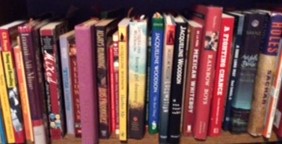So many creatives in children's literature have passed over the years. I still have a newspaper clipping of an obituary for Gwendolyn Brooks that I look at from time to time. I want to remember and honor these artists because their work has meant so much to me.
Ashley Bryan, author, illustrator, teacher
Gwendolyn Brooks, poet
Lucille Clifton, poet
Floyd Cooper, author, illustrator
Leo Dillon, illustrator
Eloise Greenfield, author
Virginia Hamilton, author
bell hooks, author, scholar
Julius Lester, author, teacher
Patricia McKissack, author
Toni Morrison, author
Walter Dean Myers, author
Jerry Pinkney,
illustrator
Faith Ringgold, artist, author
Ntozake Shange, playwright, poet
Althea Tait, scholar
Joyce Carol Thomas, author, playwright
VivianYenika-Agbaw, scholar
*I realize some writers (e.g., hooks, Morrison, and Shange) may be more well-known for writing for adults rather than children.

